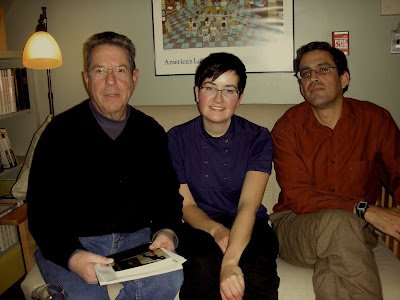Walter Cronkite met Gertrude Stein. Here it is, as reported by the NY Times:A 1935 profile of Gertrude Stein from The Daily Texan, unearthed by the student newspaper of the University of Texas at Austin and published at its Web site, was written by Walter Cronkite, who was an 18-year-old undergraduate at the university when he wrote it. (Mr. Cronkite’s memorial service was on Thursday; a report by Brian Stelter is here.)
Speaking to Stein in advance of her appearance at the university’s Hogg Auditorium on March 22, 1935, Mr. Cronkite wrote that, even though he “imposed upon her at a late hour last night,” the author was “genuine — the real thing in person. Her thinking is certainly straightforward; her speech is the same.”
After recording her attire (“a mannish blouse, a tweed skirt, a peculiar but attractive vest affair, and comfortable looking shoes”), Mr. Cronkite talked with her about the proper role of the writer and the impact of the Great Depression, then in its sixth year.
Discussing her craft, Stein told Mr. Cronkite, “A writer isn’t anything but contemporary. The trouble is that the people are living Twentieth Century and thinking Nineteenth Century.”
Presaging former Senator Phil Gramm’s remarks about a “mental recession,” Stein said that the Great Depression was “more moral than actual. No longer the people think they are depressed, the depression is over.”
(Stein proved less prescient when she said that “those who know in France didn’t believe that there would be a war.” She added: “But then war is just like anything else. When people get tired of peace they will have war and when they get tired of war they will have peace. Don’t you, when you have been good for a long time, want to be bad?”)
After Mr. Cronkite noted the presence of “Miss Alice B. Toklas, Miss Stein’s traveling companion whose title is not ‘secretary,’ ” he wrote that she enjoyed her first trip to Texas. (“This is a beautiful big State of yours,” she told him.) And that’s the way it was.
 And another old video. We've been in the convert-from-VHS biz lately. I like this one. It was produced by Penn admissions and featured George "Chip" Blaustein as a Writers House mainstay: he was on the KWH staff, member of the "Virgin House Quartet" which played in our Arts Cafe every Thursday night for several years. Click here and watch the excerpt.
And another old video. We've been in the convert-from-VHS biz lately. I like this one. It was produced by Penn admissions and featured George "Chip" Blaustein as a Writers House mainstay: he was on the KWH staff, member of the "Virgin House Quartet" which played in our Arts Cafe every Thursday night for several years. Click here and watch the excerpt.

















 "I teach horizontally, meaning that while I might begin with a fixed idea of what I'm going to teach that day, I let it drift rhizomatically way off topic, often pulling it back when it gets too far. I rely on non-fixed materials to teach this way; the whole world is at my fingertips. Should I go off on a tangent about John and Rauschenberg and their love relationship as expressed in Rauschenberg's bed, an image of that bed is always a click away. From there, we can head anywhere into the non-fixed universe, be it film, text or sound. And of course, that always takes us elsewhere. As Cage says, 'We are getting nowhere fast.'"
"I teach horizontally, meaning that while I might begin with a fixed idea of what I'm going to teach that day, I let it drift rhizomatically way off topic, often pulling it back when it gets too far. I rely on non-fixed materials to teach this way; the whole world is at my fingertips. Should I go off on a tangent about John and Rauschenberg and their love relationship as expressed in Rauschenberg's bed, an image of that bed is always a click away. From there, we can head anywhere into the non-fixed universe, be it film, text or sound. And of course, that always takes us elsewhere. As Cage says, 'We are getting nowhere fast.'" 

 that anyone has yet got the imaginative measure of that terrifying day six years ago. Certainly our Tolstoy has not crawled out of the rubble. The closest we have, Don DeLillo, succeeded as an essayist-journalist ("In the Ruins of the Future: Reflections on Terror and Loss in the Shadow of September,” Harper’s, December 2001) but, to my mind, failed as a novelist ("Falling Man"). One reason, perhaps, is that the remembered emotion was instantly buried under a pile of cultural junk.' - Tod Gitlin in his review of Susan Faludi's The Terror Dream (written for
that anyone has yet got the imaginative measure of that terrifying day six years ago. Certainly our Tolstoy has not crawled out of the rubble. The closest we have, Don DeLillo, succeeded as an essayist-journalist ("In the Ruins of the Future: Reflections on Terror and Loss in the Shadow of September,” Harper’s, December 2001) but, to my mind, failed as a novelist ("Falling Man"). One reason, perhaps, is that the remembered emotion was instantly buried under a pile of cultural junk.' - Tod Gitlin in his review of Susan Faludi's The Terror Dream (written for 






























